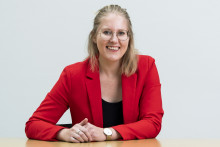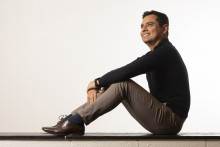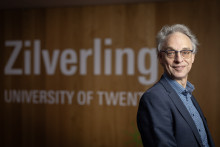Dieuwertje Alblas
Works at: Mathematics of Imaging & AI chair, Faculty of Electrical Engineering, Mathematics and Computer Science (EEMCS)
Studied: Mathematics at the University of Twente
Originally from: Goor, The Netherlands
‘I come from Twente and I always knew that I wanted to study at the UT. I came here for an Open Day when I was in high school and I knew it was the place for me. I didn’t know what programme I wanted to study, but I knew it would be here. I didn’t really plan to study Applied Mathematics. I originally wanted to apply for Technical Medicine, but I was worried I might not get in, and so I started thinking of a plan B – which was mathematics. After visiting both programmes for a day, I realized I liked mathematics more and decided to go for it. I don’t regret this decision, but my interest in clinical applications remained. I ended up working on a medical topic for my PhD, just from a different perspective.
I research the abdominal aorta, the main vessel that supplies blood to limbs and organs in our body. My study focuses on people who have an abdominal aortic aneurysm, which is a bulge or swelling of the aorta. Aneurysms are quite common, especially among older men, and in many cases it can be harmless. People often don’t even know they have it. However, the danger is that the aneurysm could rupture. If that happens, the patient needs immediate assistance and an emergency surgery. Sadly, the mortality rate is very high in these cases. That is why we want to prevent the rupture from happening.
Aneurysm rupture can be averted by surgery. Deciding which patients require preventive surgery is a difficult task. Vascular surgeons base this decision purely on the diameter of the aneurysm, but many smaller aneurysms can rupture while some bigger ones can remain harmless. Therefore, this decision should be based on other measurements as well. We aim to make the treatment more patient specific. The goal of my research is to use artificial intelligence (AI) to determine when the surgery is needed. I am developing new techniques to automatically obtain relevant information from existing image data of the patients. The goal is to use this information to support vascular surgeons.’
‘Doing a PhD was not necessarily my plan. I became open to the option during my Master’s studies, but I wasn’t completely convinced. Committing four years to one topic seemed like a very long time to me. Now I’m already one and half years in and I realize how little four years actually is. Time flies by. It is going very well so far. It was a big unknown for me, but I didn’t expect to enjoy my project this much.
To those who are considering to do a PhD, I’d say: if you find the topic interesting, just do it. I wasn’t sure if I was good enough, and if I would enjoy it. But, the bottom line is: if you don’t try, you’ll never know. I thought doing a doctoral research would be super stressful. I thought you’d have to work all the time to the point of being almost burnt out, but that is not the case for me. I’m busy and set high expectations for myself, but I don’t feel too stressed. Sometimes I might feel overwhelmed, but then it’s best to make a rough planning and just start somewhere. I’ve been having a very positive experience. I’ve loved how many people I could meet and all the places I could travel to thanks to work. I’m also trying to set up more collaborations with other groups and researchers at the UT and hospitals, which is very exciting. Others are using what I have created. That is a great feeling.
I really enjoy doing research now. I’m very driven and motivated to continue it, but I haven’t experienced major setbacks yet. That can be the harsh part of academia – if you work on something really hard, it can still get rejected for a journal or conference. You don’t have control over these things and that can be difficult. However, I don’t have a lot of experience with this yet. It’s hard for me to say if I want to stay in academia or go to industry after my PhD. I just want to have fun and do what motivates me. For now, I am happy that I can work on something that I really enjoy for four years. We’ll see what comes after.’








